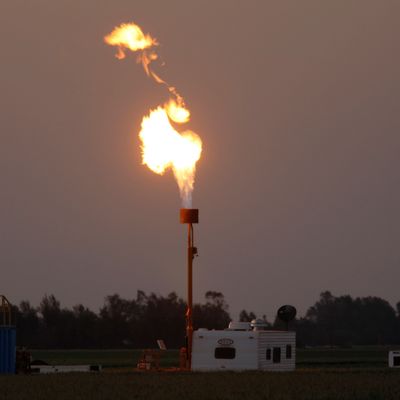
Natural gas is better for the climate than coal — except when it’s much, much worse.
When burned for electricity, gas yields roughly half as much carbon dioxide as coal. For this reason, as the fracking industry has eaten into Big Coal’s market share over the past decade, C02 emissions at U.S. power plants have fallen by more than 25 percent.
But natural gas’s main component, methane, is actually more destructive for the climate than CO2 is — if it leaks into the atmosphere before being burned. In fact, methane is so effective at trapping heat, once in the atmosphere, the chemical can produce about 80 times more warming than an equal amount of carbon dioxide.
For this reason, the Environmental Protection Agency spent years preparing a rule that would require natural gas companies to update their equipment (so as to minimize the risk of methane leaks), and also collect more data on how much gas that they leak into the air.
But Scott Pruitt nixed that regulation, in one of his first actions as EPA director last year. And now, a new study has found that Pruitt allies in the gas industry have been releasing far more methane into the atmosphere than we’d previously thought. As the New York Times reports:
The new study, published Thursday in the journal Science, puts the rate of methane emissions from domestic oil and gas operations at 2.3 percent of total production per year, which is 60 percent higher than the current estimate from the Environmental Protection Agency. That might seem like a small fraction of the total, but it represents an estimated 13 million metric tons lost each year, or enough natural gas to fuel 10 million homes.
It’s worth noting that, even if these findings are accurate, natural gas use is still harming the environment less than coal; recent research suggests that gas power plants would need to have a leakage rate above 4 percent before their net impact on the climate would be worse than coal plants.
But given the fact that methane leaks are wholly preventable, that gas companies have a financial interest in not wasting their product via leaks, and that humanity desperately needs to reduce greenhouse gas emissions to avoid the (increasingly likely) prospect of near-term ecological catastrophe, it’s rather maddening that gas plants are leaking this much. The International Energy Agency recently estimated that the gas industry could easily reduce its methane emissions by 75 percent — and that the bulk of those reductions would pay for themselves in the form of saved gas.
Alas, to this point, financial and humanitarian incentives haven’t been enough to persuade the natural gas industry to diligently avoid spewing dangerous chemicals into the atmosphere. And Scott Pruitt is preventing the government from giving it a regulatory incentive to do so.
In a saner society, that last fact would probably be a bigger scandal than the EPA director’s profligate spending on “tactical pants.”






























